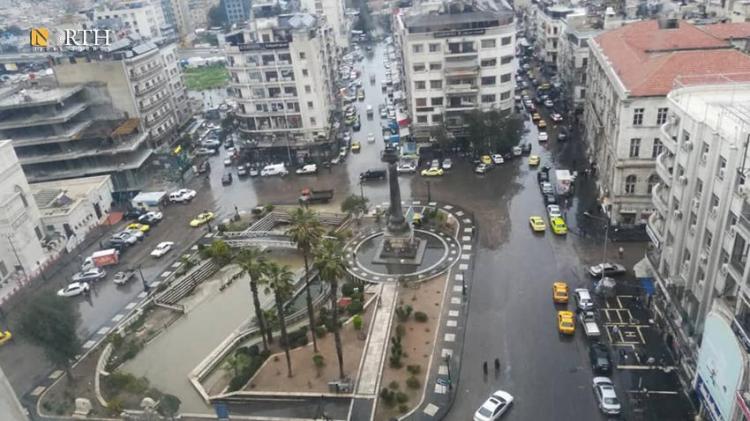Damascus – North-Press Agency
Syria is witnessing an unprecedented controversy due to the conflict between Syrian President Bashar al-Assad and his cousin Rami Makhlouf, who was once considered an economic mainstay of the Syrian government, amid fears of repercussions of undesirable consequences regarding the economic and security situation in the areas under government control.
Makhlouf threatens, Assad bans him from leaving the country
Makhlouf, who appeared in several videos, blamed the Syrian government for what would result from the new approach against him, launching veiled threats of economic collapse and famine. Those threats took on a more stringent character on May 19th, when he hinted he would use his men to respond to the Syrian government's decision to seize his and his family's property, via a post on his official Facebook page, “I said that God has men if they want, God will.”
The Syrian government has responded to Makhlouf's threats by issuing a decision banning him from traveling outside the country based on an order issued by the Administrative Judicial Court in Damascus on May 20th.
Muhammad, a merchant from Damascus, said: "Rami Makhlouf has many tools that can turn the security and economic situation of the country upside down, and the collapse of the Syrian pound is only one of the results of the existing differences with Makhlouf."
Since the beginning of the Syrian crisis, Rami Makhlouf has formed militias composed of gunmen from the Syrian coast, most notably the National Defense Militia, which had very large concessions and had great influence in Syrian government-controlled areas.
Despite official attempts to disband this militia, it still has significant influence in the areas of the Syrian coast and the capital, Damascus.
Makhlouf the savior of the pro- families
Makhlouf was able to win the support of Alawites via the Al-Bustan Association, through which he provided relief assistance to a large number of low-income Alawite families, in addition to providing medical and hospital services and granting artificial limbs to wounded Syrian army veterans who were neglected in government military hospitals because of patronage and the administrative routine, in addition to Makhlouf's contribution to supporting infrastructure in the densely populated Alawite areas. For example, Al-Bustan Association maintained and strengthened the electrical network and purchased huge transformers for the Mazza 86 area in Damascus, which solved the problem of permanent outages during supplying hours without the ability of the government electric company to solve the problem, in addition to its contribution to the maintenance of the many roads and stairs scattered in that neighborhood inhabited by an Alawite majority.
Syrian authorities recently seized Al-Bustan Association and transferred its ownership from Rami Makhlouf, which was demonstrated by the association's statement on May 23rd, which confirmed that the association "works under the supervision of President Bashar al-Assad and performs its charitable, humanitarian, and development work with follow-up and supervision of the President of the Republic," amid discontent from the citizens who benefit from its services.
Observers believe that the seriousness of this conflict lies in the fact that the majority of low-income Alawites stand by Makhlouf, preferring him even to Syrian President Bashar al-Assad, which is evident on social media and in the street as well.
Ghadeer Wissam (a pseudonym), a lawyer in Damascus, said: "Through our daily meetings with a large number of officers and members of the Syrian army, they clearly expressed their support for Makhlouf in the face of the 'conspiracy' that they considered Russia to be behind."
He added that although they did not clearly declare that they are more loyal to Makhlouf than Assad himself, Alawite families live under difficult circumstances, and the majority of them depend on the salaries of their children employed by government departments, which no longer allows them to meet their basic needs for more than five days. They see in Makhlouf the only “savior” from hunger, as is evidenced by their dissatisfaction with the campaign against the "Baron" of the Syrian economy.
The conflict with Makhlouf was not an option for Assad
Seizing Rami Makhlouf's money and his family's property created conditions and developments that will change the course of events in Syria. Wissam concludes: "Syria after the dispute with Makhlouf will not be like Syria before."
There is no doubt that the Syrian president and his government were forced to open this front with Makhlouf aimed at collecting large amounts of money from him in order to fill the huge deficit in the Syrian economy, in light of the continued collapse of the Syrian pound and the lack of sufficient revenues for the state treasury as vital areas got out of government control such as ports, phosphate mines, oil wells, and gas fields, according to economists.
According to these experts, the government pursued a policy of doubling fees and taxes and imposing new taxes on Syrians, starting with imposing taxes on civil affairs, immigration, passport, higher education taxes, and the taxes of the Ministry of Transport and the Ministry of Communications, which recently raised the prices of Internet and made it restricted after it was open; however, all these taxes were not enough to fill the state treasury shortage.
They also point out that al-Assad would not have opened such a front if he had not known well that Syria's economy is on a worse stage with the imminent implementation of the Caesar Act that is imposing severe sanctions on the Syrian government and anyone who deals with it.

